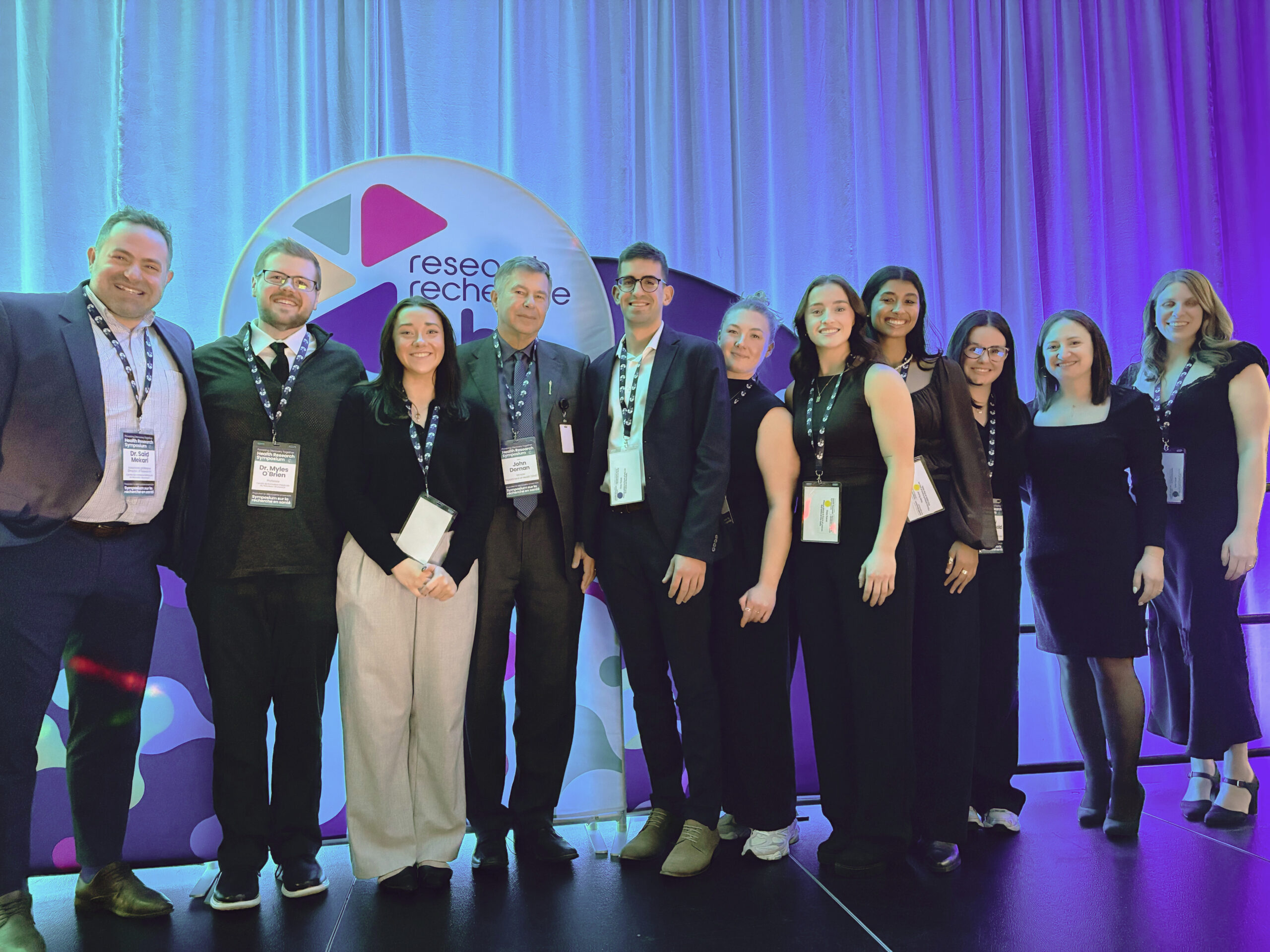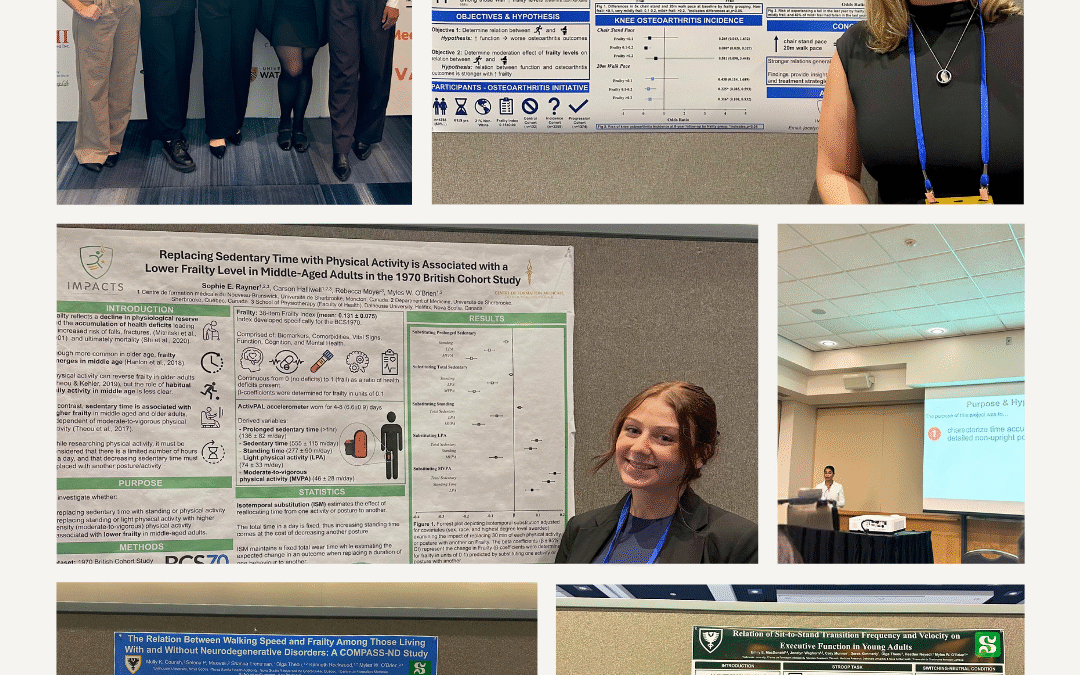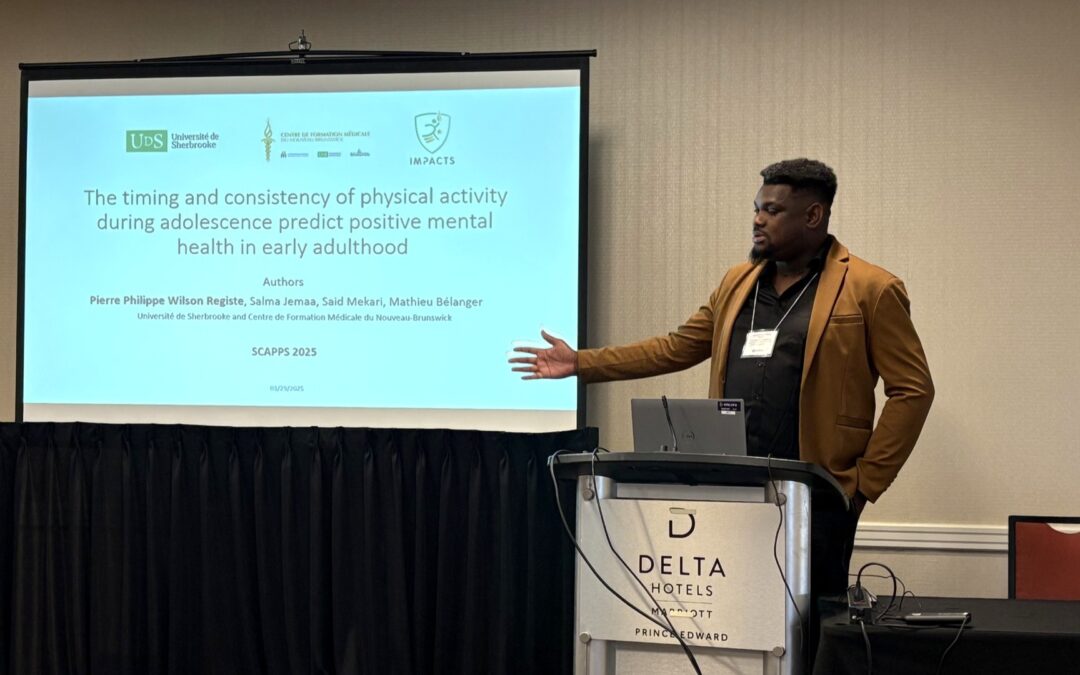
by Julie Dufresne | Nov 24, 2025 | Collaboration, Conference, Results, Students
Researchers and students had the privilege of meeting Hon. Dr. John Dornan, New Brunswick Minister of Health and Candice Ashley Pollack, Chief Executive Officer at ResearchNB. During the event, we shared updates on our projects and explored how research can inform evidence-based health policies. These conversations reinforce the value of connecting researchers and decision-makers to improve health outcomes for our communities.

by Julie Dufresne | Nov 7, 2025 | Conference, Students
From October 15-18 October, some students from the IMPACTS Lab had the opportunity to present their research at the CSEP 2025 Conference in London, Ontario. Here’s an overview of their research contributions in the areas of mobility, aging, and frailty:
- Jocelyn Waghorn (Poster) – Examining the Relation Between Lower-Limb Functional Performance Measures and Knee Osteoarthritis Outcomes by Varying Frailty Levels
🔍 Lower-limb function strongly relates to osteoarthritis outcomes, especially in frailer individuals. Strategies are needed to help vulnerable adults maintain function and joint health.
- Sophie Rayner (Poster) – The association between physical activity and frailty index within the British cohort study
🔍 More sedentary time = higher frailty. Replacing just 30 minutes of sedentary time with light or moderate-to-vigorous activity can make a difference.
- Madeline Shivgulam (Free Communication) – Characterizing posture in long-term care & the relation of habitual postures with frailty
🔍 Older adults in long term care spend most of their day sitting or lying. Promoting upright time, sit-to-stand transitions, and knee-bent sitting rather than lying are warranted for frailty management.
- Molly Courish (Poster) – The Relationship Between Walking Speed & Frailty Among Those Living With and Without Neurodegenerative Disorders: A Study of Adults from the COMPASS_ND Study
🔍 Faster gait speed is linked to lower frailty levels in neurodegenerative populations. Enhancing gait speed may be key to reducing frailty in vulnerable groups.
- Emily MacDonald (Poster) – Relation of Sit-to-Stand Transition Frequency and Velocity on Executive Function in Young Adults
🔍 Surprisingly, faster transitions may be linked to poorer cognitive performance. A fascinating look at mobility and cognition in youth.
👏 Congratulations to all presenters for sharing their work.

by Julie Dufresne | Oct 22, 2025 | Conference, MATCH, Students
Pierre Philippe Wilson REGISTE had the opportunity to present his doctoral research at the Canadian Society for Psychomotor Learning and Sport Psychology (SCAPPS) annual conference in Prince Edward Island from October 2–4. Based on data from the MATCH Study, his presentation explored how the timing and consistency of physical activity during adolescence are associated with mental health outcomes in early adulthood.
🔍 Key takeaway: Sustained physical activity—especially in late adolescence—can support better mental health in early adulthood. Given today’s context, interventions that boost physical activity in late adolescence may help foster better mental health later in life.
Pierre is supervised by Pr Mathieu Bélanger and Pr Said Mekari de la Faculté de médecine et des sciences de la santé – Université de Sherbrooke.

by Julie Dufresne | Jun 4, 2025 | cardiac health, Conference, Results, Students
Pamela Tanguay, a student at the IMPACTS lab and doctoral candidate in health sciences research at Université de Sherbrooke, presented the results of her work comparing hybrid and traditional cardiac rehabilitation programmes at the Canadian Association of Cardiovascular Prevention and Rehabilitation (CACPR) 2025 Spring Conference in Calgary, Alberta. Pamela is supervised by professors Mathieu Bélanger and Nicole Marquis.

by Julie Dufresne | May 29, 2025 | Conference, MATCH, Results, Students
Our colleague Pierre Philippe Wilson Registe took part in the 3rd edition of the Symposium des étudiants en épidémiologie du Québec, held on May 22nd at the School of Public Health of the Université de Montréal. He presented his work on the importance of consistent measurements for monitoring physical activity during the transition from adolescence to adulthood from the MATCH research project directed by Prof Mathieu Bélanger.

by Julie Dufresne | Apr 1, 2025 | Conference, Students
This annual event is an opportunity for students from the universities in the region to present their research work in relation to kinesiology, and to foster collaboration within the university community of the four Atlantic provinces. The University of Prince Edward Island hosted this year’s APES + Conference.
1) Pierre FAIVRE: Role of exercise and brain physiological mechanisms in the development of executive functioning in coronary artery disease in older adults.
2) Madeline Shivgulam: Characterizing Posture in Long-Term Care & the Relation of Habitual Postures with Frailty.
3) Pierre Philippe Wilson REGISTE: Does using the same measure matter for physical activity tracking from adolescence to early adulthood?
4) IMPACTS Lab: Prof Myles O’Brien, Madeline Shivgulam, Pierre Faivre, Pierre Philippe Wilson Registe and Prof Said Mekari
5) Prof Myles O’Brien extended team: Sophie Rayner, Jocelyn Waghorn, Emily MacDonald, Sophie Inkpen, Carson Halliwell, Madeline Shivgulam.






